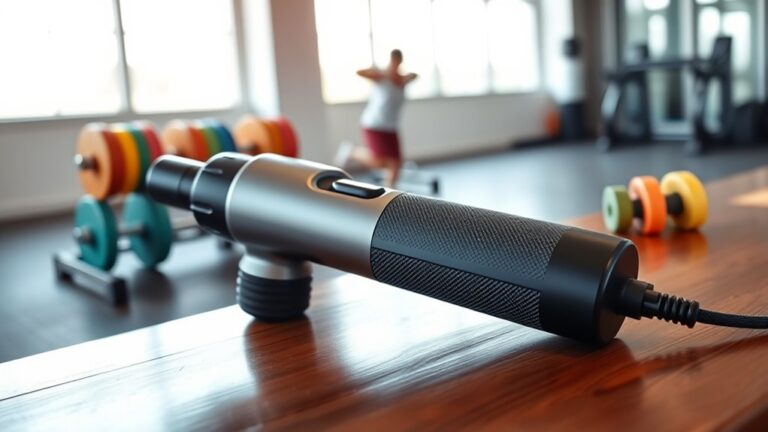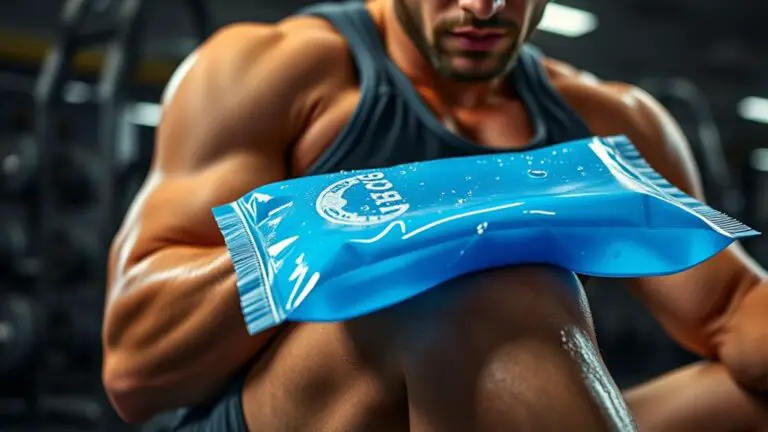The Best Recovery Drinks for Gym Athletes
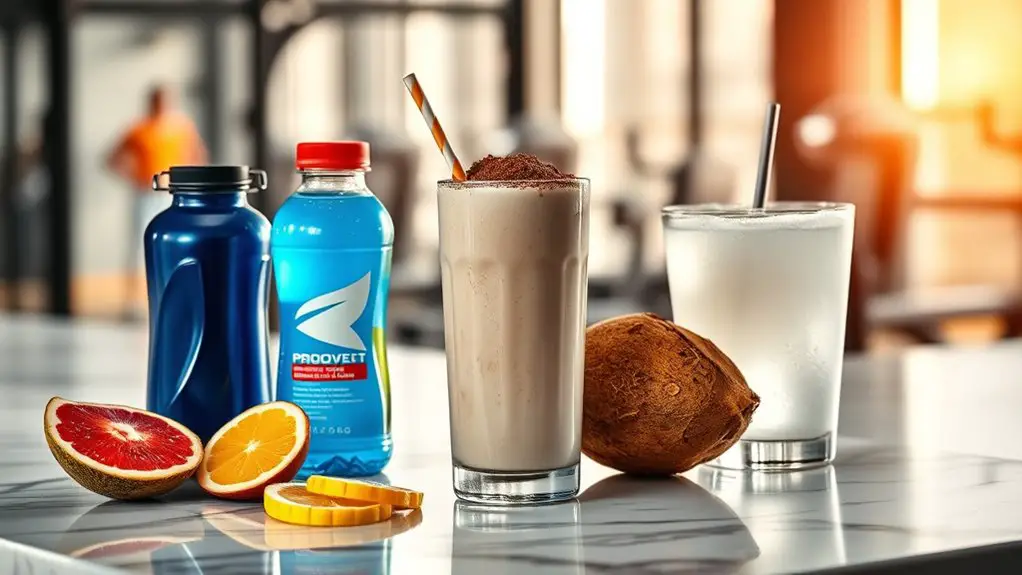
The best recovery drinks for gym athletes are those that balance carbohydrates and protein to enhance muscle repair and replenish energy. Consider options like protein shakes, chocolate milk, or recovery smoothies that combine fruits, greens, and protein sources. Electrolyte drinks like coconut water can rehydrate while replenishing essential minerals. Don’t overlook tart cherry juice for its anti-inflammatory benefits, or bone broth for added nutrients. Learn more about making informed choices and optimizing your recovery!
The Importance of Post-Workout Nutrition
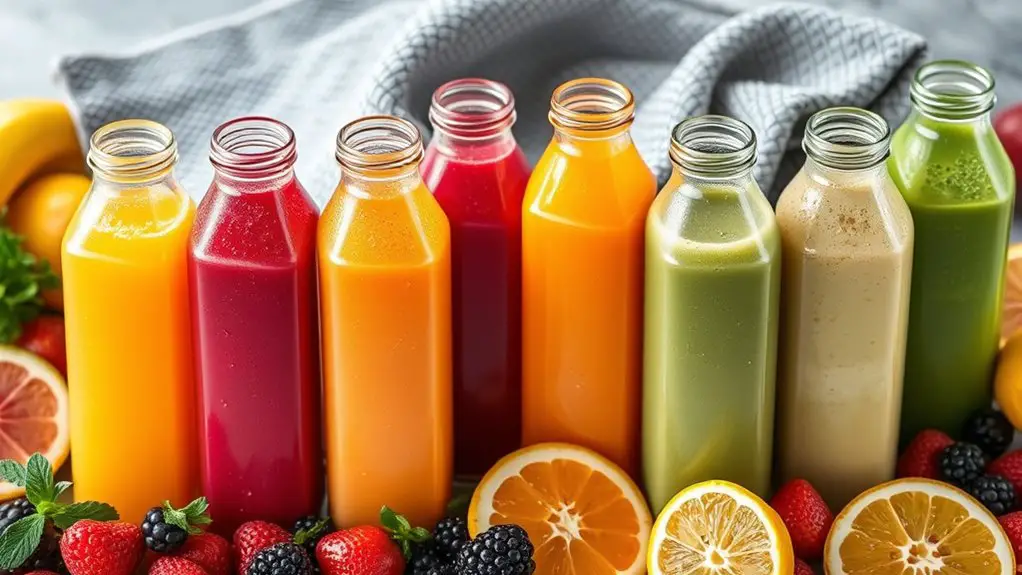
After you finish a rigorous workout, the choices you make about nutrition can greatly impact your recovery and performance. Prioritizing post-workout nutrition can lead to significant post workout benefits, such as reduced muscle soreness and improved strength gains. It’s essential to understand nutrient timing—consuming the right nutrients within a specific timeframe after exercise can enhance recovery. Research suggests that eating a combination of carbohydrates and protein within 30 to 60 minutes post-exercise helps replenish glycogen stores and supports muscle repair.
For ideal results, aim for a 3:1 ratio of carbohydrates to protein. This approach can stimulate insulin release, facilitating nutrient uptake into your muscles. Remember, the sooner you refuel, the better your body can recover. By making informed choices about post-workout nutrition, you’ll set yourself up for greater performance in future workouts and support overall athletic goals.
Protein Shakes: A Classic Choice
Protein shakes are a staple for gym athletes looking to enhance recovery. You’ll want to contemplate the different types of protein shakes available, the best timing for consumption, and whether homemade options are better than store-bought. Understanding these factors can greatly impact your recovery process and overall performance.
Types of Protein Shakes
Whether you’re looking to rebuild muscle after an intense workout or simply want a convenient source of nutrition, protein shakes are a classic choice for gym athletes. They come in various types, primarily categorized into whey protein and plant-based options, each offering unique benefits.
Here’s a quick comparison:
| Type | Protein Source | Benefits |
|---|---|---|
| Whey Protein | Dairy | Fast absorption, muscle growth |
| Casein Protein | Dairy | Slow digestion, sustained energy |
| Pea Protein | Plant-Based | Allergen-friendly, rich in iron |
| Soy Protein | Plant-Based | Complete protein, heart health |
Choosing the right protein shake depends on your dietary preferences and fitness goals. With these options, you can easily find a shake that suits your needs.
Timing for Optimal Recovery
To maximize recovery, it is vital to consume your protein shake within a specific timeframe post-workout. Research suggests that the best recovery timing is within 30 minutes to 2 hours after exercising. This window allows your muscles to benefit from protein’s anabolic effects, promoting ideal absorption and muscle repair. Consuming a shake during this period enhances glycogen replenishment and reduces muscle soreness. Aim for a blend of protein and carbohydrates in your shake, as this combination can further improve recovery outcomes. Remember, the quality of your protein source matters too; faster-digesting options like whey can be particularly effective. By prioritizing timely consumption, you’re setting yourself up for better performance and quicker recovery in your training regimen.
Homemade vs. Store-Bought
When considering recovery options, have you ever wondered whether homemade or store-bought protein shakes are better for your needs? Homemade recipes offer the advantage of customization, allowing you to tailor ingredients based on dietary preferences and nutritional goals. You can control the protein source, sweetness, and even add superfoods like chia seeds or spinach. On the other hand, store-bought brands provide convenience and often contain a balanced mix of proteins, carbs, and electrolytes, making them ideal for those on the go. However, they may contain added sugars or preservatives, which can be less desirable. Ultimately, the best choice depends on your lifestyle, budget, and specific recovery needs. Experimenting with both options can help you find what works best for you.
Electrolyte Drinks for Hydration
Electrolytes are essential for maintaining hydration and supporting muscle function during and after your workouts. Without them, you risk experiencing cramps, fatigue, and decreased performance. Let’s explore some of the top electrolyte options available to help you stay replenished.
Importance of Electrolytes
Maintaining proper electrolyte levels is essential for athletes, especially after intense workouts. Electrolytes, like sodium, play a key role in regulating hydration and muscle function. When you sweat, you lose not just water but also critical minerals that help maintain sodium balance in your body. This imbalance can lead to dehydration, muscle cramps, and fatigue, hindering your recovery and performance.
Incorporating effective hydration strategies—like electrolyte drinks—after exercising can greatly enhance your recovery. These drinks replenish lost electrolytes, ensuring that your body can efficiently restore its balance. By prioritizing electrolyte intake, you’re setting yourself up for better hydration and overall athletic performance. Remember, it’s not just about water; it’s about restoring those essential minerals, too.
Top Electrolyte Options
Finding the right electrolyte drink can make a significant difference in your post-workout recovery. Electrolytes like sodium and potassium help replenish what’s lost during intense exercise. Here are some top electrolyte options to evaluate:
| Drink | Key Features |
|---|---|
| Coconut Water | Natural sodium sources, rich in potassium benefits |
| Sports Drinks | Balanced electrolytes, quick absorption |
| Electrolyte Powders | Customizable, low-calorie options |
Coconut water provides natural sodium and an excellent source of potassium, promoting muscle function and hydration. Sports drinks often have added sugars but can be beneficial for quick recovery. Electrolyte powders give you flexibility in customizing your intake, helping you meet your specific hydration needs post-workout. Choose wisely to enhance your recovery!
Coconut Water: Nature’s Sports Drink
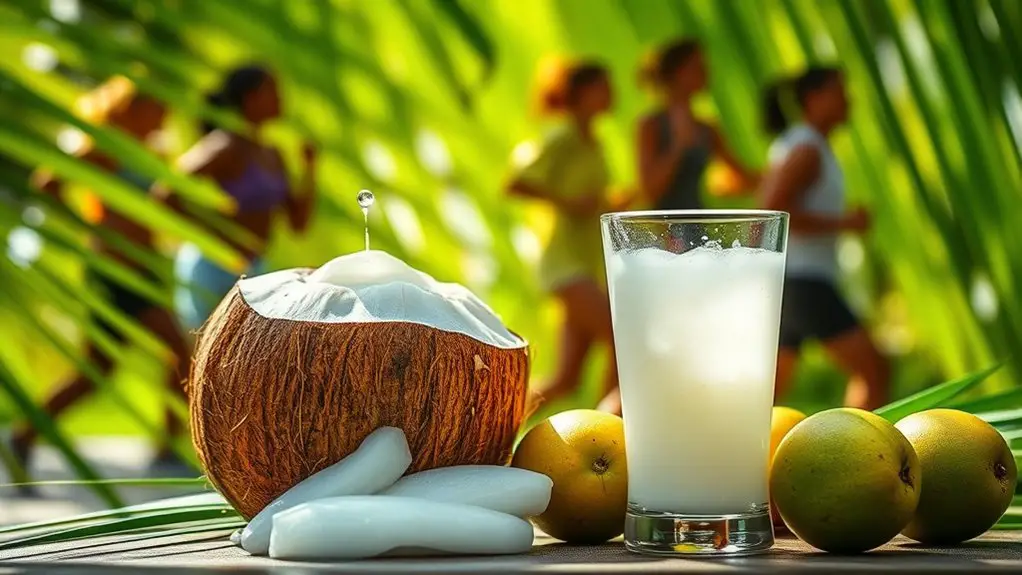
While you may think of sports drinks as the go-to option for hydration during workouts, coconut water has emerged as a natural alternative that offers impressive benefits. Packed with essential electrolytes like potassium and sodium, it effectively replenishes lost minerals after intense exercise. Research shows that coconut water’s hydration properties rival those of traditional sports drinks, making it an excellent choice for recovery.
The coconut benefits extend beyond hydration; it’s low in calories and sugar, which makes it a healthier option for athletes. Its natural antioxidants help combat exercise-induced oxidative stress, promoting quicker recovery. Additionally, coconut water is easily digestible, reducing the risk of gastrointestinal issues often associated with commercial sports drinks.
Incorporating coconut water into your post-workout routine can enhance your hydration strategy while providing a revitalizing taste that keeps you coming back for more. So, next time you’re looking for a recovery drink, consider reaching for coconut water.
Chocolate Milk: A Surprisingly Effective Option
After exploring the benefits of coconut water, it’s time to contemplate another surprisingly effective recovery drink: chocolate milk. This classic beverage offers a unique blend of chocolate benefits and essential nutrients that can accelerate your recovery post-workout. The combination of carbohydrates and protein in chocolate milk is ideal for replenishing glycogen stores and repairing muscles.
Here’s a quick comparison of chocolate milk and some popular milk alternatives:
| Option | Protein (g) | Carbs (g) | Fat (g) |
|---|---|---|---|
| Chocolate Milk | 8 | 26 | 5 |
| Almond Milk | 1 | 2 | 2.5 |
| Soy Milk | 6 | 4 | 4 |
| Oat Milk | 2 | 16 | 1.5 |
With its rich nutrient profile and great taste, chocolate milk can be a convenient choice for your recovery needs.
Recovery Smoothies: Customizable and Delicious
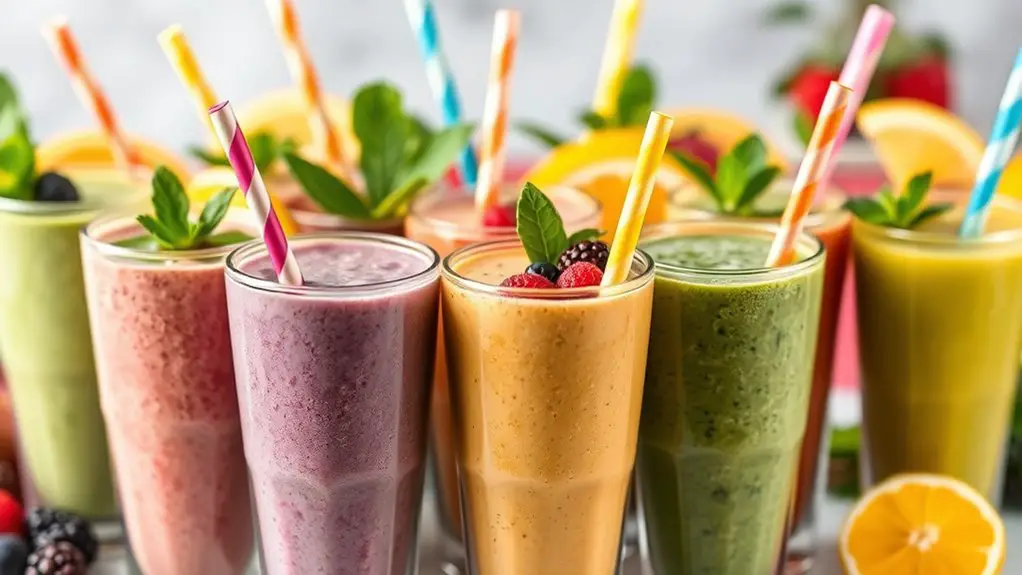
Recovery smoothies are a fantastic way to refuel after a workout, especially since you can easily customize them to meet your specific nutritional needs. By mixing different smoothie ingredients, you can create delicious flavor combinations that not only taste great but also aid in recovery. Here are three essential components to take into account:
Recovery smoothies are a delicious and customizable way to refuel after workouts, aiding in your recovery and meeting nutritional needs.
- Protein Source: Include Greek yogurt, protein powder, or nut butter to support muscle repair.
- Fruits: Bananas, berries, or mangoes add natural sweetness and essential vitamins, while also providing carbohydrates for energy replenishment.
- Greens: Spinach or kale can be added for an extra nutrient boost without altering the flavor too much.
Experimenting with these smoothie ingredients allows you to tailor your post-workout drink to your taste and nutritional goals. So, mix and match to find your perfect recovery smoothie that keeps you energized and satisfied!
Tart Cherry Juice: A Natural Anti-Inflammatory
If you’re looking for additional ways to enhance your post-workout recovery, tart cherry juice is an excellent option to contemplate. Packed with antioxidants, tart cherry juice offers significant tart cherry benefits, particularly for athletes. Its anti-inflammatory properties can help reduce muscle soreness and improve recovery time after intense workouts.
Studies show that drinking tart cherry juice can decrease markers of inflammation and oxidative stress, which are common after strenuous exercise. By incorporating this natural juice into your recovery routine, you may experience less muscle pain and quicker recovery, allowing you to train more effectively.
Simply mix tart cherry juice with water or enjoy it straight after your workout for ideal results. Whether you’re lifting weights or running long distances, tart cherry juice can be a invigorating and beneficial addition to your post-exercise nutrition strategy. Consider making it a staple in your recovery regimen for enhanced performance and reduced inflammation.
Bone Broth: Nutrient-Rich Recovery
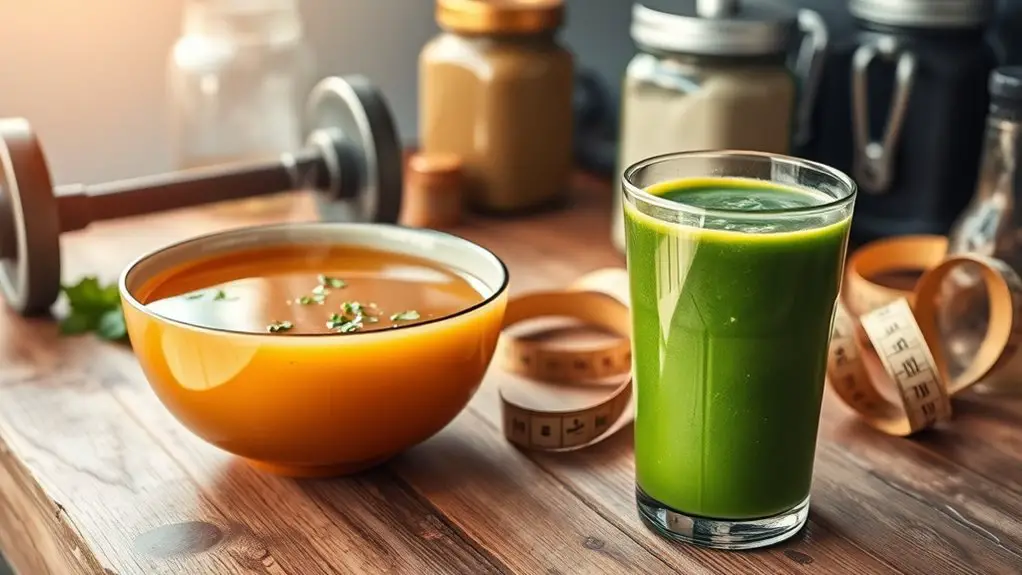
While you might be familiar with various post-workout drinks, bone broth stands out as a nutrient-rich option that can greatly aid your recovery. Packed with essential nutrients, it offers numerous bone broth benefits that support muscle repair and overall health. Making homemade bone broth is simple and allows you to control the ingredients for ideal nutrition.
Here are three key benefits of incorporating bone broth into your recovery routine:
- Rich in Collagen: Collagen helps repair joints and connective tissues, promoting faster recovery after intense workouts.
- High in Amino Acids: These building blocks of protein are vital for muscle repair and growth.
- Hydrating: Bone broth replenishes fluids and electrolytes, helping to maintain hydration levels post-exercise.
Commercial Recovery Drinks: What to Look For
After exploring the benefits of nutrient-rich options like bone broth, it’s important to evaluate the variety of commercial recovery drinks available on the market. When you’re choosing a drink, start by checking the ingredient labels. Look for a balance of carbohydrates and proteins, ideally in a 3:1 ratio, which effectively aids muscle recovery.
Market trends often highlight drinks that contain added electrolytes, which help replenish what you lose during workouts. Avoid options with excessive sugar or artificial ingredients, as these can hinder recovery.
Also, consider the presence of essential amino acids, particularly BCAAs, which play a crucial role in muscle repair. Finally, keep an eye on the calorie content to verify it aligns with your fitness goals. By focusing on these factors, you’ll be better equipped to select a recovery drink that supports your training regimen effectively.
Frequently Asked Questions
How Soon After a Workout Should I Consume a Recovery Drink?
You should aim to consume a recovery drink within 30 to 60 minutes after your workout. This post workout timing is vital for ideal nutrient absorption, as your muscles are primed to absorb nutrients and replenish glycogen stores. Delaying your intake beyond this window can reduce the effectiveness of your recovery. So, don’t wait too long; getting those essential nutrients into your body promptly can greatly enhance your recovery process.
Can I Make My Own Recovery Drink at Home?
Sure, you can whip up your own recovery drink at home! Who needs store-bought magic when DIY recipes are at your fingertips? Just remember, it’s all about the ingredient ratios; too much banana might turn your masterpiece into a smoothie disaster. Combine protein powder, water, and a pinch of salt for electrolytes, or try coconut water for a tropical twist. With a little experimentation, you’ll find the perfect blend for your post-workout needs!
Are Recovery Drinks Suitable for Non-Athletes?
Yes, recovery drinks can be suitable for non-athletes, particularly if you’re looking to replenish nutrients after physical activity. They offer recovery benefits by providing hydration, electrolytes, and essential nutrients that help in muscle repair and energy restoration. Even if you aren’t hitting the gym, if you engage in regular physical activity, these drinks can cater to your needs. Just be mindful of the ingredients to guarantee they align with your health goals.
What Ingredients Should I Avoid in Recovery Drinks?
Did you know that about 60% of recovery drinks contain artificial sweeteners? You should avoid these ingredients, as they can negatively affect your gut health and metabolism. Additionally, steer clear of high fructose corn syrup, which can spike your blood sugar and provide empty calories. Instead, look for drinks with natural sugars and whole food ingredients to support your recovery effectively and maintain overall health.
How Do I Know if a Recovery Drink Is Effective?
To know if a recovery drink’s effective, look for balanced ingredient ratios of carbohydrates and protein, ideally around a 3:1 ratio. You should also consider taste preferences; if you enjoy it, you’ll likely consume it more regularly. Check for evidence of ingredients like electrolytes and amino acids that support recovery. Finally, monitor your post-workout soreness and energy levels to gauge its effectiveness over time.
